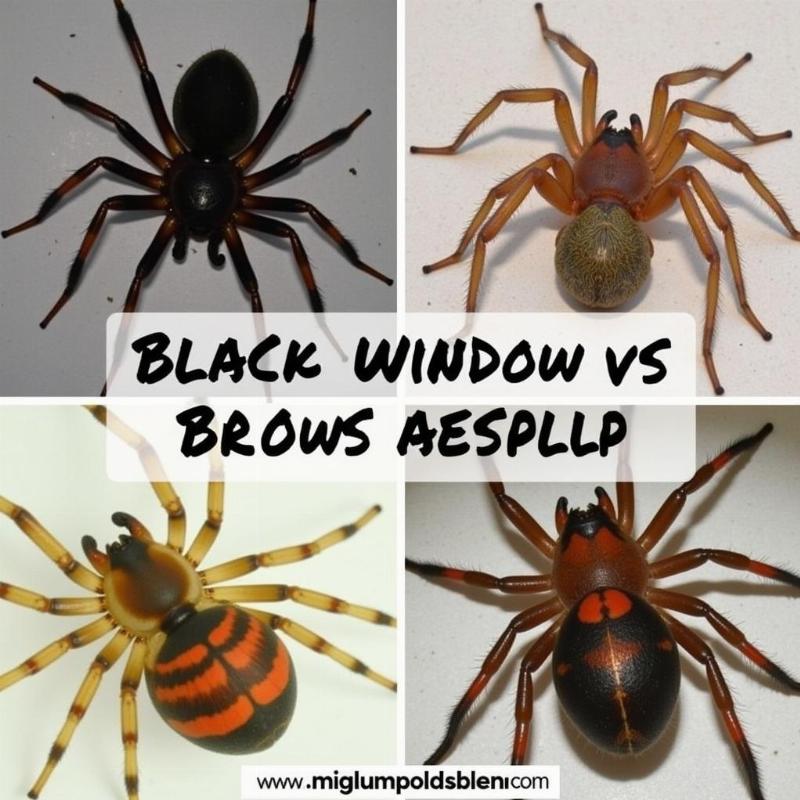Spider bites in dogs can be a serious concern for pet owners across the US. While many spiders are harmless, some venomous species can pose a significant threat to your furry friend. Understanding the signs, symptoms, and treatment options for spider bites is crucial for ensuring your dog’s safety and well-being. This article will provide you with essential information to help you identify, manage, and prevent spider bites in your canine companion.
Identifying a Spider Bite on Your Dog
Recognizing a spider bite can be challenging, as the initial signs can be subtle. Look for redness, swelling, or pain at the bite site. Your dog may also exhibit behavioral changes such as licking or scratching excessively at the affected area. More severe reactions can include muscle tremors, weakness, vomiting, diarrhea, difficulty breathing, and even paralysis.
If you suspect your dog has been bitten by a spider, it’s essential to seek veterinary care immediately, especially if you live in areas known for venomous spiders like the black widow or brown recluse. Early intervention can significantly improve your dog’s prognosis.
Common Types of Venomous Spiders in the US
Several venomous spiders inhabit the US, posing potential risks to dogs. The black widow is notorious for its neurotoxic venom, which can cause muscle cramps, paralysis, and even death. Brown recluse spiders, on the other hand, possess cytotoxic venom that causes tissue damage and necrosis at the bite site.
 Venomous Spiders in the US
Venomous Spiders in the US
Other spiders like the hobo spider and yellow sac spider can also cause localized pain and swelling, though their bites are generally less severe than those of the black widow or brown recluse.
Treatment for Spider Bites in Dogs
Treatment for spider bites varies depending on the spider species and the severity of the reaction. Your veterinarian may administer pain medication, anti-inflammatory drugs, or antivenom if necessary. Supportive care, such as intravenous fluids and wound management, is crucial for promoting healing and preventing secondary infections.
Preventing Spider Bites
Protecting your dog from spider bites involves minimizing exposure to these arachnids. Keep your home and yard clean and free of clutter, which can provide hiding places for spiders. Regularly inspect areas where spiders are likely to dwell, such as woodpiles, basements, and garages. When outdoors, keep your dog on a leash and avoid areas with dense vegetation.
Conclusion
Spider bites can be a serious threat to your dog’s health. By being vigilant, understanding the signs and symptoms, and taking preventative measures, you can help protect your furry friend from these potentially dangerous encounters. Remember, prompt veterinary care is crucial if you suspect your dog has been bitten by a spider.
FAQs
-
What are the first signs of a spider bite on a dog? Redness, swelling, pain, and excessive licking or scratching at the bite site are common initial signs.
-
Which spiders are most dangerous to dogs in the US? Black widows and brown recluses pose the most significant threats.
-
What should I do if I think my dog has been bitten by a spider? Seek immediate veterinary care.
-
How can I prevent spider bites in my dog? Keep your home and yard clean, inspect potential hiding places, and keep your dog on a leash when outdoors.
-
Are all spider bites venomous? No, many spiders are harmless. However, it’s crucial to seek veterinary attention if you’re unsure.
-
Can a spider bite kill a dog? Yes, bites from venomous spiders like the black widow can be fatal if left untreated.
-
How long does it take for a spider bite to heal on a dog? Healing time varies depending on the spider species and the severity of the reaction.
Beautdogs.us is your trusted source for comprehensive and engaging information on dog care and companionship in the US. We offer expert advice on dog breeds, grooming, health, nutrition, and more. Whether you’re a first-time dog owner or a seasoned pro, Beautdogs.us is your go-to resource for all your dog-related needs. Contact us today for expert guidance and support! Email: [email protected], Phone: +1 501-555-7529. Visit Beautdogs.us for more helpful tips and advice!